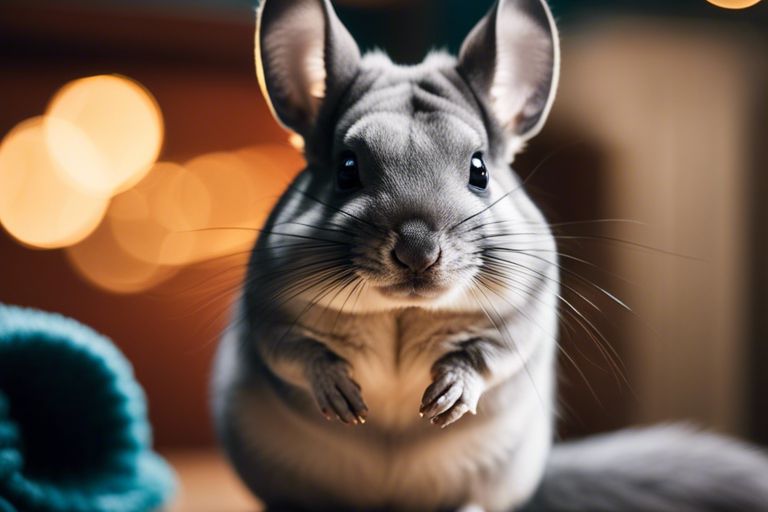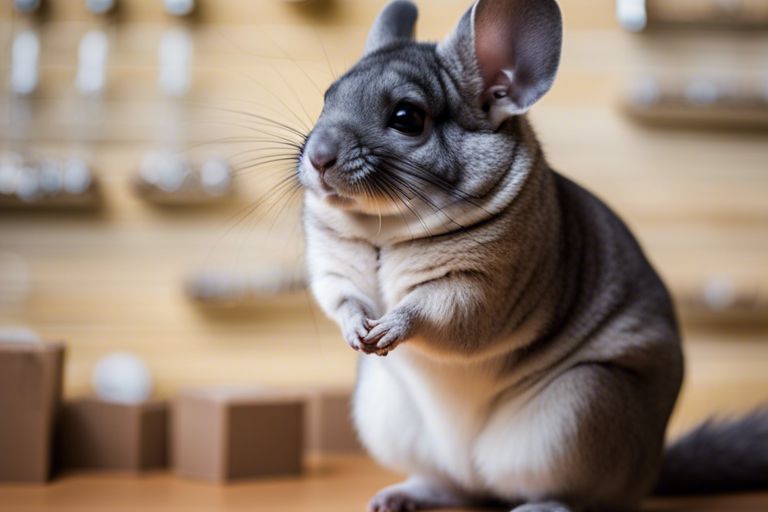Challenges arise when deciding to welcome a chinchilla into your home. These adorable creatures come with their own set of pros and cons that potential owners need to consider. From their delicate respiratory systems that require specific care to their social nature that demands daily interaction, owning a chinchilla requires dedication and knowledge. In this blog post, we will explore into the challenges of owning a chinchilla, exploring both the pros and cons to help you make an informed decision before bringing one of these unique pets into your life.
Key Takeaways:
- Long Lifespan: Chinchillas have a lifespan of around 10-20 years, which means a long-term commitment.
- Special Care Requirements: Chinchillas have specific needs like dust baths, a proper diet, and temperature control, requiring dedicated care and attention.
- Health Concerns: Chinchillas are prone to dental issues and fungal infections, necessitating regular veterinarian check-ups and potential medical costs.
Understanding Chinchillas
Natural Habitat and Behavior
While chinchillas are commonly known as adorable pets, it’s crucial to understand their natural habitat and behavior to provide them with the best care possible. In the wild, chinchillas are native to the Andes Mountains in South America, where they thrive in high altitudes and cool temperatures. They are crepuscular animals, meaning they are most active during dawn and dusk.
Chinchilla Characteristics and Traits
Chinchillas have a few key characteristics and traits that make them unique pets. These small rodents have soft and dense fur that helps them stay warm in their native mountainous habitats. They also have large, expressive eyes and long whiskers that aid in their sensory perception. Chinchillas are known for their playful and inquisitive nature, often engaging in activities like jumping and climbing to satisfy their natural instincts. Additionally, they are extremely agile and can reach high speeds when running or leaping.
Challenges of Chinchilla Ownership
Specialized Dietary Needs
For chinchilla owners, one of the main challenges is meeting their pet’s specialized dietary needs. Chinchillas require a diet high in fiber and low in fat to maintain their delicate digestive systems. Their diet primarily consists of hay, supplemented with chinchilla pellets and occasional treats like dried fruits. It’s crucial to provide the right balance of nutrients to ensure your chinchilla stays healthy.
Environmental Requirements
Dietary needs are just one aspect of caring for a chinchilla. These pets have specific environmental requirements that need to be met for their well-being. Chinchillas are sensitive to heat and humidity, thriving in cool, dry conditions. Additionally, providing a spacious cage with plenty of room to climb and exercise is necessary for their physical and mental health.
Another important environmental consideration is the need for a dust bath. Chinchillas have dense fur that needs regular dust baths to stay clean and healthy. Providing a dedicated dust bath area in their cage is crucial for their grooming routine.
Need for Regular Interaction and Socialization
On top of their dietary and environmental needs, chinchillas also require regular interaction and socialization. These social animals thrive on companionship and can suffer from loneliness if left alone for long periods. Engaging with your chinchilla through gentle handling, playtime, and social interactions is crucial for their mental well-being.
It’s necessary to create a bond with your chinchilla to ensure they feel secure and happy in their environment. Regular handling and interaction will help prevent behavioral issues and ensure a strong human-animal bond.
Veterinary Care and Health Concerns
The health of a chinchilla can be challenging to maintain, as they are prone to dental issues, gastrointestinal problems, and fur-related ailments. Regular veterinary check-ups are necessary to detect any health concerns early and provide appropriate treatment. Chinchillas are adept at hiding signs of illness, so vigilant monitoring of their behavior and eating habits is crucial.
The key to a healthy chinchilla is prompt veterinary care and a well-established relationship with an exotic pet veterinarian experienced in treating these unique animals.
Lifespan and Long-term Commitment
Longterm commitment is another challenge of chinchilla ownership. Chinchillas have a relatively long lifespan for small rodents, living up to 15 years in captivity. Committing to caring for a chinchilla means being prepared for a long-term responsibility that includes providing for their needs throughout their entire life.
A chinchilla owner must be ready for the commitment of caring for these special pets for years to come, ensuring their well-being and happiness well into their senior years.
Pros and Cons of Owning a Chinchilla
| Pros | Cons |
| Chinchillas are adorable and entertaining pets. | Chinchillas have specific environmental requirements. |
| Chinchillas have long lifespans, with some living up to 20 years. | Chinchillas require regular dust baths to maintain their fur. |
| Chinchillas are generally low maintenance and clean animals. | Chinchillas can be prone to stress-related health issues. |
| Chinchillas are social animals that can form strong bonds with their owners. | Chinchillas have specific dietary needs and can be sensitive to changes. |
| Chinchillas have soft, dense fur that requires minimal grooming. | Chinchillas can be prone to dental problems if not given proper chew toys. |
Benefits of Chinchilla Companionship
With their affectionate nature and playful behavior, chinchillas can bring joy and companionship to their owners. Their gentle demeanor and cute antics make them delightful pets to interact with, providing both entertainment and emotional support.
Drawbacks and Considerations
The decision to own a chinchilla comes with specific considerations. Chinchillas are sensitive to temperature changes and require a cool environment to thrive. Additionally, their dental health needs must be carefully monitored, as dental issues can arise and impact their well-being. For instance, improper diet and lack of dental care can lead to overgrown teeth, which can be painful and even life-threatening if left untreated.

Providing Quality Care for Chinchillas
Creating an Appropriate Living Environment
Your chinchilla’s living environment plays a crucial role in their overall well-being. Chinchillas require a spacious cage made of wire or metal to allow for ample ventilation and climbing opportunities. Provide bedding made of high-quality dust-free materials such as aspen shavings or recycled paper to ensure their comfort and prevent respiratory issues.
Meeting Nutritional and Exercise Needs
Care for your chinchilla by providing a balanced diet consisting of high-quality hay, fresh water, and pelleted chinchilla food to ensure they receive crucial nutrients. Supplement their diet with occasional treats like dried fruits and vegetables. Additionally, chinchillas need regular exercise to maintain their physical health. Provide a safe area for them to run and play outside of their cage, such as a secure playpen or chinchilla-proofed room.
Conclusion
Upon reflecting on the challenges of owning a chinchilla, it is evident that there are both pros and cons to consider. From their long lifespan and specialized care requirements to their delightful personalities and soft fur, chinchillas make rewarding companions. However, potential challenges such as their sensitivity to temperature, need for social interaction, and dental health issues must be carefully managed by responsible pet owners. By understanding these challenges and taking proactive measures to address them, chinchilla owners can provide a loving and fulfilling environment for their furry friends.
FAQ
Q: What are the challenges of owning a chinchilla?
A: Owning a chinchilla comes with its own set of challenges. These include providing a suitable living environment that mimics their natural habitat, ensuring they have a proper diet, handling their delicate nature with care, and dedicating time to socialize and bond with them.
Q: What are the pros of owning a chinchilla?
A: There are many advantages to owning a chinchilla. They are adorable, clean, and low-maintenance pets that don’t require daily walks. They have a long lifespan of around 10-20 years and are known for their playful and curious behavior, making them entertaining companions.
Q: What are the cons of owning a chinchilla?
A: Despite their endearing qualities, owning a chinchilla also has its drawbacks. They have specific dietary and habitat needs that require time and effort to maintain. Chinchillas are sensitive animals that can easily become stressed, and their veterinary care can be more expensive compared to other small pets.
